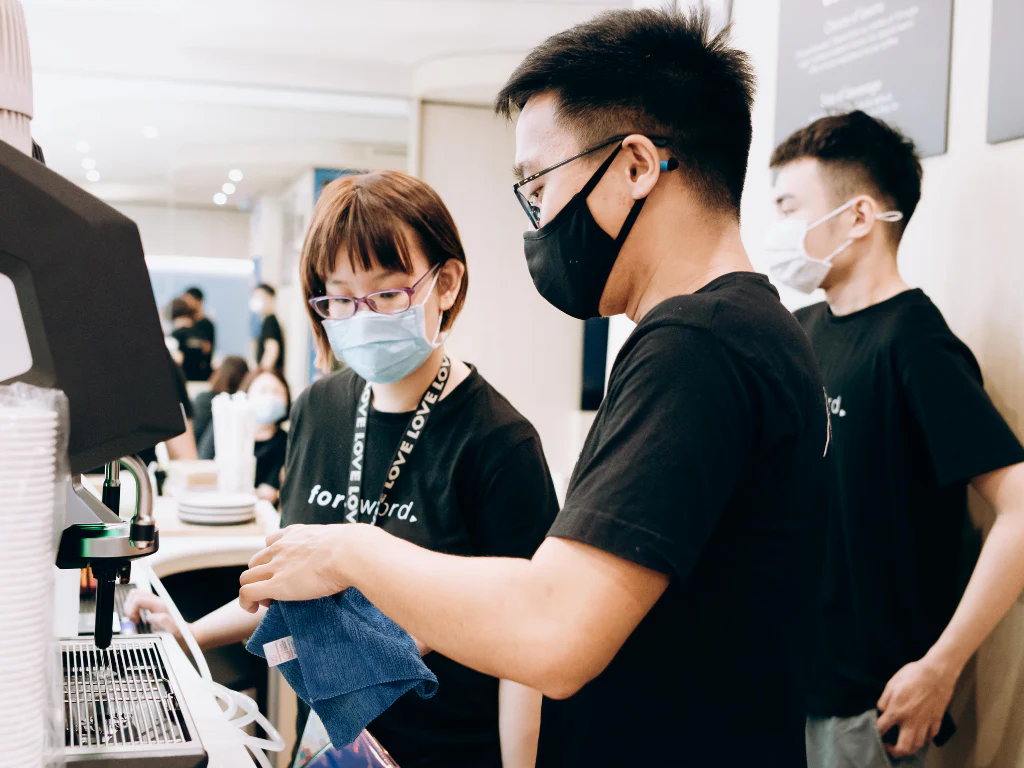The social entrepreneurship journey for Foreword was not without our ups and downs. As we turn five years old, we reflect on five lessons we learnt along the way as an organization.
Although we have had our fair share of publicity sharing about our achievements along the years, we managed along with much help and support from our friends, family, interns, volunteers, community partners, and the government (with the various business grants and subsidies and all).
 Screenshot taken from Baristas (A Short Documentary).
Screenshot taken from Baristas (A Short Documentary).
1) The hardest barrier to overcome is the lack of self-esteem.
Many people come to Foreword after a long period of unemployment or after facing multiple rejections from other workplaces. The lack of self-esteem is a big barrier to overcome before our employees with disabilities can pick up new skills. We need to change their mindset of “I can’t” to “I can” and this takes time and conscious effort to manage expectations both from their side and from our side.
I’ve had an experience with an ex-employee who placed very high expectations on himself when he was new to the workplace. He had undue pressure to perform even though we set out more achievable goals. I’ve tried my best to manage his expectations, but he felt bad for the slightest mistakes and was not able to get over the negative feelings. Soon he decided to throw in the towel, and I respected his decision as I felt I’ve tried enough.
Even now, I feel that he is a good worker and a pleasant person. I wished him well and hope that there is a better job fit out there for him.
2) Although helpful, automation is not always desirable.
At the founding of Foreword, we aspired to create seamless barista workflow aided with technology. As we break down the coffee-making process into smaller tasks, we identified that milk frothing is probably the hardest task of the whole workflow. When we opened our 2nd outlet at the Centre for Healthcare Innovation, we purchased an espresso machine with an automatic steam wand to produce nicely steamed milk.
Within the first week of use, the automatic steam wand was rendered useless. Our café supervisor – who is deaf – found it too loud when using it. Persons who are deaf are still able to hear at certain frequencies depending on the severity of their hearing loss. The automatic frothing function produces a very loud screeching noise that makes it uncomfortable for both our café team and customers. That was a disaster. In the end, our café crew learnt the manual milk frothing techniques and they did a pretty good job of it.
Having said that, we went back to automation at our 4th outlet at Canberra Plaza, where we procured the Eversys espresso system with the aim of expanding the job scopes of our employees with special needs who are working there. The Eversys creates beautifully steamed milk with their automatic steam wand, and this time it is also quiet.
 The Eversys machine which helps baristas with special needs create good milk.
The Eversys machine which helps baristas with special needs create good milk.
Our café crew with learning needs no longer need to learn the manual way of milk frothing, but focus on creating latte art and improving on our customer engagement. Most recently 2 of our part-time café crews are starting to take on more responsibilities and training to be co-leaders at the café.
3) It is okay to accept the help offered by others.
As a for-profit business, we didn’t feel comfortable with volunteers within the company. We felt that it was only right that we provide salaries and allowances for any manpower support rendered to the company.
This changed as I went through a mentorship session for social enterprise startup founders, where I asked about how I should be managing volunteers within the organization and was advised to change my perspective on having volunteers. At that time, I have had enquiries for volunteering opportunities within Foreword, and I decided to give it a go.
One of the volunteers have stuck through with us for more than a year since she joined Foreword in 2021. Kelly spends 2-3 sessions, 2-3 hours per session, a week at our café outlets, providing counselling and job coaching support, freeing up my time to fulfil my other roles in the company. Having someone else other than the boss to provide support is also comforting for the Foreword team.
Kelly is now a familiar face and a friend to many of our Foreword staff. She continues to volunteer her time with us on a weekly basis.
4) Sometimes it’s not about having more time, but about doing things differently.
Being a parent with a child with autism, Mrs Phua knows best when it comes to teaching Daniel the skills required at the workplace. Everything that Daniel needs to learn, Mrs Phua would need to learn it first, and then she adapts for Daniel’s learning.
Similarly, this is the approach Foreword takes when it comes to training our staff with disabilities. Instead of sending our staff for regular training courses outside, Nadi and I were the ones to expose ourselves to the coffee courses out there, synthesize the knowledge and skills, then coming up with ways to teach our team.
 A typical scene of staff training.
A typical scene of staff training.
It would be crazy to do the same things expecting different results. Hence, in our supervisor training, our café supervisors are encouraged to use different modes of teaching, such as getting the café staff to take photos and videos for their revision, on top of practising drills and communicating via writing. Since the implementation of different modes of training, our café staff have showed improvements in their tasks!
5) We’re not the silver bullet to social inclusion.
Our society still has a long way towards true inclusion. Foreword is an outlier as persons with disabilities are the majority in our company, and someone without disabilities may, for once, find it a challenge to fit into our company. While we are accepting of people from different backgrounds and we try to provide as much opportunities as we can, we are mindful that we cannot accept everyone and anyone.
For recent hires, I communicate to the caregivers that I adopt the 80-20 principle when assessing the employee’s job fit within Foreword. If we are putting in 80% effort and seeing only 20% results from the employee, then there may be a job mismatch here. There have been occasions when we extend the probation or find ways to re-designate our employees so that they continue to explore their potential and we carry the hope that with more time, the individuals will get better at things.
 When it comes to onboarding new people, staff are exposed to a myriad range of tasks to help them find their strengths.
When it comes to onboarding new people, staff are exposed to a myriad range of tasks to help them find their strengths.
Thank YOU for being part of Foreword’s journey! One of the key tenets in building Foreword is to learn from experiences and from the inputs given by our employees, and the caregivers of our employees. We’re also happy to hear your thoughts on how Foreword can serve customers better, and to build a company that will last for more years ahead.
This article is written by Wei Jie, co-founder of Foreword Coffee Roasters.





